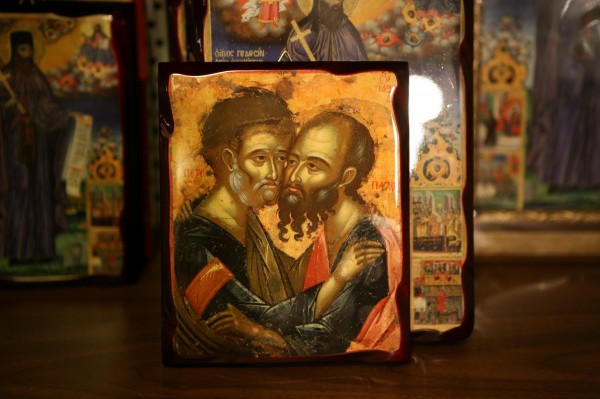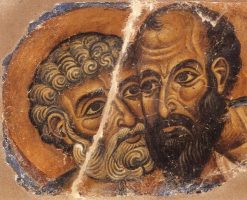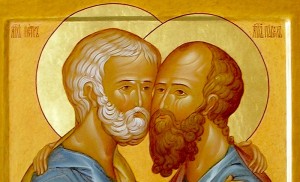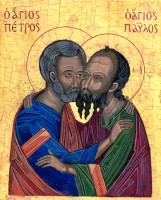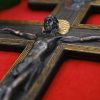None of us can tell the story of our lives without pointing to particular persons we have known and who have shaped us. In our families and friendships, people are not interchangeable, for we are all unique in our relationships with one another and with God. We play particular roles that are colored by our character, personal history, and distinctive blend of strengths and weaknesses. That is also how it is in the life of the Church. Particular people matter.
Today we celebrate two of the most glorious Saints of the Christian faith. They are both pillars of the Church, apostles, and martyrs whose unique personalities and experiences have made decisive and permanent contributions to the Body of Christ. Saint Peter was the head disciple whose confession, “You are the Christ, the Son of the living God,” is the rock on which Christ, our true foundation, has built His Church. The gospels describe Peter’s presence at so many crucial moments in the ministry of the Lord, including at His arrest when Peter, who had so clearly confessed Him earlier and vowed never to abandon Him, denied Him three times. Of course, the risen Christ restored Peter by asking him three times if he loved Him and giving him the command to feed His sheep as a shepherd of the flock of Christians. And in the book of Acts, we see Peter boldly proclaiming the good news, performing miracles, and playing a key role in welcoming Gentiles into the Church. After serving as the first bishop of Antioch, where the disciples were first called Christians, then he went to serve in Rome. Peter was crucified there upside down for his faith in Jesus Christ, for by Peter’s own request he was unworthy to die in the same way as His Savior.
That St. Paul plays a glorious role in the formation of the faith is obvious to anyone who knows the New Testament, for he wrote so much of it. He traveled for decades founding and supporting churches, especially among Gentiles. Paul himself was Jewish and had been a strict Pharisee who had persecuted Christians. But on the road to Damascus, the risen Lord appeared to Him in a blinding light and called him to repentance and the shocking ministry of bringing Gentiles into the Body of Christ through faith, not circumcision and obedience to the Old Testament law. Perhaps more than anyone else, Paul made clear that the Christian faith is not a sect of Judaism primarily for people of a particular ethnic and religious heritage, but instead good news for all people, regardless of their ancestry.
As today’s epistle passage reminds us, Paul’s ministry was not easy by any stretch of the imagination. He was beaten, imprisoned, humiliated, and ultimately martyred in Rome for his faith in Jesus Christ. He knew both the heights of spiritual ecstasy and the chronic challenge of a “thorn in the flesh” that God did not remove, despite his three-fold request. Whatever that thorn may have been, Paul learned through his sufferings the sufficiency of God’s strength for him. God’s “strength is made perfect in (Paul’s) weakness.“ As the apostle said of himself, “For when I am weak, then I am strong.”
When we study the lives of these two great saints, we do not see people who made no mistakes or who were rich, famous, or without problems. These were real human beings who fell short, repented, grew over time in their understanding, and faced such opposition that both suffered capital punishment at the hands of the pagan Romans. They gained absolutely no worldly advantages by their faithful ministry, but their selfless service strengthened the Church in ways too numerous to count. We are here today as Orthodox Christians because of what God did through them and so many other lesser known apostles, martyrs, and evangelists across the ages.
In order to celebrate worthily the feast day of Sts. Peter and Paul, we must go beyond praising them with our words. We must participate personally in the holiness so evident in them. In other words, we must become like them in a way appropriate to our particular calling and location. For just as God used a fisherman and a Pharisee with given sets of strengths and weaknesses to His glory, He intends to do likewise with each of us. The first century is long gone, but there is plenty of time left in the twenty-first century for us to hear and respond to the same risen Lord who called Peter to feed His sheep and Paul to become a missionary to the Gentiles. Like the Ephesians to whom Paul wrote, we too have become “fellow citizens with the saints and members of the household of God, having been built on the foundation of the apostles and prophets, Jesus Christ Himself being the chief cornerstone…” (Eph. 2:19-20)
Each generation is like a new story added to the building or a new branch growing on a tree. Even as we find our personal history in the previous generations of our families, we take our spiritual life from the living history of what the Holy Spirit has done through each generation in the life of the Church. We are called to make present in our day the same faithfulness that we see in those who have gone before us, but we do so as unique, unrepeatable persons called to grow in the divine likeness and to find the fullness of our identity through union with the Lord like an iron left in the fire. Just as a fisherman and a Pharisee became radiant with the divine energies through their repentance and steadfast dedication to Christ, the same can be true of us.
We may think, however, that we are simply too sinful to achieve such spiritual heights. We know that we fall short and may be ashamed even to think of becoming like these great saints. Remember for just a moment, however, that Peter denied Christ three times at His arrest and Paul persecuted Christians to the point of death. If they can repent, follow Jesus Christ faithfully, and have such exalted roles in the life of the Church, who are we to excuse ourselves from whatever God wants of us in our families, our parish, our work, or whatever it might be? In all likelihood, we will live and serve in obscurity and face obstacles much smaller than the brutal persecution these great saints endured.
As well, we may be tempted to think that they were so much stronger than we are. Remember that St. Paul found God’s strength precisely in his weakness, in his infirmities and pains that opened his life to the gracious power of God. St. Peter must have felt weak when the Lord said “Get behind me, Satan” to him when he tried to explain to Christ that He would not be rejected and killed. And could there be any greater moment of weakness than when the disciple who boasted that he would never abandon the Savior did so at his arrest by denying Him three times?
Our moments of weakness are probably less dramatic, but they are no less real. We find it hard to do the basics of the Christian life: forgive our enemies; pray each day and fast regularly; attend the Divine Liturgy and other services of the Church whenever possible; take Confession on a regular basis and especially when we have a guilty conscience about a grave sin; give generously to the poor; visit the sick and lonely; and guard our hearts and minds from the moral decay that permeates our culture.
When we are aware of our weaknesses, we are in the perfect place to follow in the way of the fisherman and the Pharisee who in humble repentance found a strength that makes up what is lacking, heals infirmities, and even conquers sin and death. Let us not use a false sense of humility to excuse ourselves from true discipleship as we celebrate the Feast of Sts. Peter and Paul. Instead, we must follow their example as the unique people we are, with all our strengths, failings, and peculiarities, for from the very beginning of the faith, that is the only way that anyone has become a saint.












